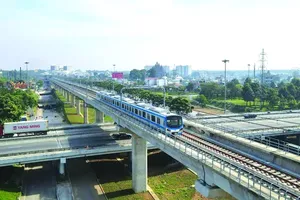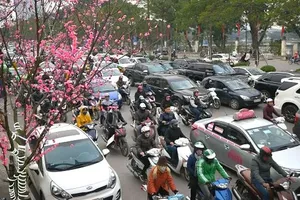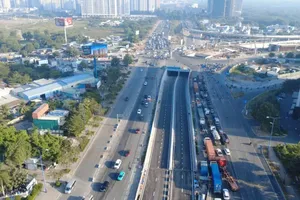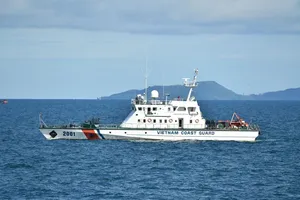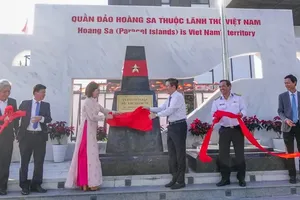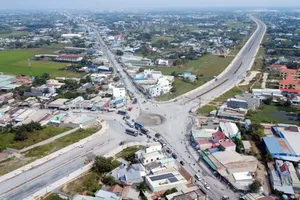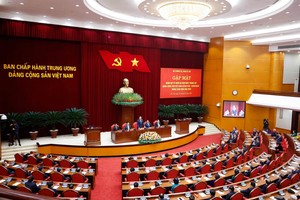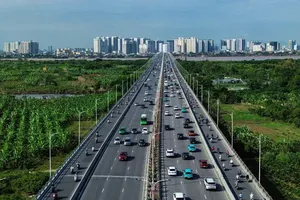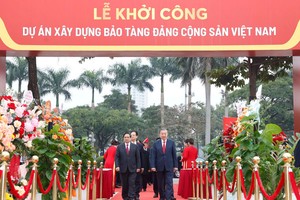However, only 66.5 percent of the project’s total workload has been completed so far, raising concerns that it may not be built in time. Among the reasons for the delay is the subjective underperformance of several construction contractors.
Once the project is put into operation, the expressway will connect the vertical highway corridor in the Mekong Delta, from Ho Chi Minh City to Ca Mau Province, contributing to national defense and security and promoting economic development not only in the Mekong Delta but also across the whole country.
Recognizing the importance of the project, Prime Minister Pham Minh Chinh, Deputy Prime Minister Tran Hong Ha and leaders from the Ministry of Construction have made multiple inspections, removing obstacles and urging investors and contractors to ensure the project is operational by 2025. However, numerous bidding packages and items of the project are progressing sluggishly, with some components falling behind schedule.
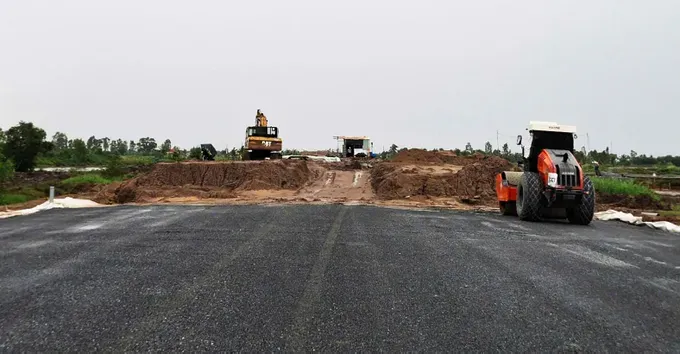
Under the direction of the Ministry of Construction, all bridges, culvert pipes, cement-stabilized soil columns and asphalt paving for the connecting route from the IC12 intersection to Vo Van Kiet Street in Ca Mau Province must be completed by May 2025. However, as observed by Sai Gon Giai Phong (SGGP) Newspaper’s reporters on June 10, multiple sections remained unfinished, machinery was idle, and there were no workers or engineers on the construction site.
Mr. Ha Tan Hien, a resident of Ho Thi Ky Commune, Thoi Binh District, Ca Mau Province, who lives near the IC12 interchange, expressed his concern that the construction site was too messy with intermittent workers so the completion would be unlikely to reach this year even though Prime Minister Pham Minh Chinh directed the project to be completed before December 19, 2025.
With only six months remaining for construction, the My Thuan Project Management Board, which is the project’s investor reported that about 66.2 percent of the construction workload had been completed, and 13 bridges on the route still lacked deck slabs and so on.
Explaining the intermittent labor activity, Mr. To Van Dut who is working on bid package XL3 in Ca Mau Province said that recent heavy rainfall has affected construction progress. The team is responsible for removing sand layers to prepare the roadbed. But as the workers began placing the first layer of stone, it kept raining, and water accumulated below the base, so they had to pause construction.
Regarding the overall delay, the My Thuan Project Management Board noted ongoing issues with embankment loading, foundation preparation, and inadequate supplies of sand and stone. Furthermore, several contractors, including VNCN E&C Construction and Engineering Joint Stock Company, Hai Dang Joint Stock Company, Thi Son Construction and Manufacturing Company Limited and Infrastructure Development 620 Company Limited are behind schedule. The construction is also hindered by the onset of the rainy season.
In response, the Ministry of Construction has directed the investors and contractors to stockpile all required stone materials on site by June 30 to start preloading and reduce reliance on sand. All preloading work must be completed by September 30. For sections using vacuum consolidation, materials and equipment must be mobilized for simultaneous large-scale implementation.
Additionally, prefabricated components and traffic safety systems must be manufactured and ordered promptly. Besides, technical measures must be adopted to shorten settlement waiting times. Roadbed construction must follow a rolling implementation immediately after preloading. Since the roadbed phase extends from September to December durring the rainy season, contractors must prepare adequate financial resources, equipment, and manpower to run three shifts a day, in four teams.
As for contractors failing to meet deadlines, the Ministry of Construction has required them to mobilize sufficient finances and equipment and fulfill contract commitments. If they cannot comply, the project owner must reassign work volumes and decisively replace underperforming contractors to ensure the project is completed on time as directed by the Prime Minister.
The Can Tho – Ca Mau Expressway project consists of a main route stretching 110 kilometers, passing through Can Tho City and the provinces of Hau Giang, Kien Giang and Ca Mau.
The connecting route is 25.85 kilometers in length.
The project is divided into two components, comprising the Can Tho – Hau Giang segment and the Hau Giang – Ca Mau section with a design of four lanes having a total investment of VND27,523 billion (US$1.1 billion).


